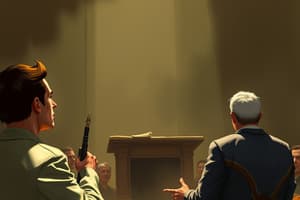Podcast
Questions and Answers
A witness is called to testify about an event they only heard about from a friend. Based on the rules of evidence, what is the most likely reason the testimony might be deemed inadmissible?
A witness is called to testify about an event they only heard about from a friend. Based on the rules of evidence, what is the most likely reason the testimony might be deemed inadmissible?
- The witness has a potential bias due to their relationship with the friend.
- The witness lacks the necessary legal expertise to interpret the event accurately.
- The witness does not have personal, firsthand knowledge of the event. (correct)
- The testimony could be considered privileged communication.
During a trial, a witness is unable to clearly recall specific details of an event, but insists they are telling the truth. Which aspect of witness competency is most directly affected?
During a trial, a witness is unable to clearly recall specific details of an event, but insists they are telling the truth. Which aspect of witness competency is most directly affected?
- The witness's understanding of their obligation to tell the truth.
- The witness's ability to remember the event. (correct)
- The witness's ability to narrate the event.
- The witness's ability to observe the event.
A defense attorney believes a seven-year-old witness is not competent to testify. What legal process would the attorney likely request to challenge the child's competency?
A defense attorney believes a seven-year-old witness is not competent to testify. What legal process would the attorney likely request to challenge the child's competency?
- A subpoena duces tecum.
- A direct examination.
- A motion for summary judgment.
- A voir dire examination. (correct)
An attorney asks a witness, "Isn't it true that the defendant is known to be dishonest?" What is the most likely reason the opposing counsel would object to this question?
An attorney asks a witness, "Isn't it true that the defendant is known to be dishonest?" What is the most likely reason the opposing counsel would object to this question?
Which of the following scenarios best illustrates the use of a subpoena duces tecum?
Which of the following scenarios best illustrates the use of a subpoena duces tecum?
In a criminal trial, the defendant chooses to testify. What constitutional right allows the prosecution to question the defendant about their testimony?
In a criminal trial, the defendant chooses to testify. What constitutional right allows the prosecution to question the defendant about their testimony?
An expert witness is called to testify about the cause of a building collapse. What is the primary basis for admitting their testimony?
An expert witness is called to testify about the cause of a building collapse. What is the primary basis for admitting their testimony?
During cross-examination, an attorney presents a witness with a prior written statement that contradicts their current testimony. What is the attorney attempting to do?
During cross-examination, an attorney presents a witness with a prior written statement that contradicts their current testimony. What is the attorney attempting to do?
In a trial about a traffic accident, a witness testifies that the defendant ran a red light. The defense attorney objects, stating the evidence is not 'relevant'. What must the attorney prove to the judge to have the testimony deemed irrelevant?
In a trial about a traffic accident, a witness testifies that the defendant ran a red light. The defense attorney objects, stating the evidence is not 'relevant'. What must the attorney prove to the judge to have the testimony deemed irrelevant?
In a case involving complex financial transactions, the judge determines she can take 'judicial notice' of prime interest rates during the period in question. What does this mean?
In a case involving complex financial transactions, the judge determines she can take 'judicial notice' of prime interest rates during the period in question. What does this mean?
A suspect is arrested and questioned but refuses to answer, invoking their Fifth Amendment privilege. What specific protection does this privilege provide?
A suspect is arrested and questioned but refuses to answer, invoking their Fifth Amendment privilege. What specific protection does this privilege provide?
During a trial, an attorney attempts to introduce a confidential email exchange with their client. Under what circumstances would the attorney-client privilege likely be waived?
During a trial, an attorney attempts to introduce a confidential email exchange with their client. Under what circumstances would the attorney-client privilege likely be waived?
A wife is called to testify against her husband in a criminal trial. Under what circumstance, related to spousal privilege, would she most likely be compelled to testify?
A wife is called to testify against her husband in a criminal trial. Under what circumstance, related to spousal privilege, would she most likely be compelled to testify?
A psychiatrist is treating a patient who admits to planning a violent act against another person. Which privilege is most likely to be superseded by the 'dangerous patient' exception?
A psychiatrist is treating a patient who admits to planning a violent act against another person. Which privilege is most likely to be superseded by the 'dangerous patient' exception?
A reporter obtains information from confidential sources relating to a corruption scandal. Under what circumstances can this "news reporter privilege" be overridden?
A reporter obtains information from confidential sources relating to a corruption scandal. Under what circumstances can this "news reporter privilege" be overridden?
In a criminal trial, a witness offers a statement that was made outside of the court to prove a fact. This is most likely considered:
In a criminal trial, a witness offers a statement that was made outside of the court to prove a fact. This is most likely considered:
What is the critical element that makes a statement 'hearsay'?
What is the critical element that makes a statement 'hearsay'?
A witness in a robbery trial testifies that, immediately after the event, they heard another person exclaim, "The robber had a blue jacket!". Under which exception to the hearsay rule might this statement be admissible?
A witness in a robbery trial testifies that, immediately after the event, they heard another person exclaim, "The robber had a blue jacket!". Under which exception to the hearsay rule might this statement be admissible?
A witness provides testimony that is considered 'testimonial hearsay'. According to the Confrontation Clause, what condition must be met for this testimony to be admissible in a criminal trial?
A witness provides testimony that is considered 'testimonial hearsay'. According to the Confrontation Clause, what condition must be met for this testimony to be admissible in a criminal trial?
In a domestic violence case, the defendant prevented the victim from testifying by intimidation. Which legal principle would allow the victim's out-of-court statements to be admitted as evidence, despite the hearsay rule and the Confrontation Clause?
In a domestic violence case, the defendant prevented the victim from testifying by intimidation. Which legal principle would allow the victim's out-of-court statements to be admitted as evidence, despite the hearsay rule and the Confrontation Clause?
Flashcards
Witness Competency
Witness Competency
The ability to perceive, recall, and relate information accurately.
Voir Dire (Child Witness)
Voir Dire (Child Witness)
A preliminary examination to determine a young child's competency to testify.
Subpoena
Subpoena
A legal order requiring a person to testify in court.
Cross-Examination
Cross-Examination
Signup and view all the flashcards
Impeachment by Prior Inconsistent Statements
Impeachment by Prior Inconsistent Statements
Signup and view all the flashcards
Relevant and Material Evidence
Relevant and Material Evidence
Signup and view all the flashcards
Judicial Notice
Judicial Notice
Signup and view all the flashcards
Fifth Amendment Privilege
Fifth Amendment Privilege
Signup and view all the flashcards
Attorney-Client Privilege
Attorney-Client Privilege
Signup and view all the flashcards
Crime-Fraud Exception
Crime-Fraud Exception
Signup and view all the flashcards
Husband-Wife Privilege
Husband-Wife Privilege
Signup and view all the flashcards
Doctor-Patient Privilege
Doctor-Patient Privilege
Signup and view all the flashcards
Hearsay Definition
Hearsay Definition
Signup and view all the flashcards
Declarant
Declarant
Signup and view all the flashcards
Confrontation Clause
Confrontation Clause
Signup and view all the flashcards
Testimonial Statements
Testimonial Statements
Signup and view all the flashcards
Non-Testimonial Statements
Non-Testimonial Statements
Signup and view all the flashcards
Excited Utterance
Excited Utterance
Signup and view all the flashcards
Business Records
Business Records
Signup and view all the flashcards
Dying Declarations
Dying Declarations
Signup and view all the flashcards
Study Notes
Witness Competency and Examination Firsthand Knowledge
- A witness needs personal firsthand knowledge to testify.
Competency to be a Witness
- Competence is a witness's capacity to accurately perceive, recall, and relate information.
Adults Presumed Competent
- Adults are generally presumed competent unless proven otherwise.
Competency Requirements
- A competent witness must be able to observe, remember, narrate, and understand the obligation to tell the truth.
Young Children as Witnesses
- Young children may need a voir dire to determine competency.
- A child's age is a consideration, but not the only factor, in determining competency.
- A judge determines witness competency.
- A jury determines the witness's credibility and the weight of their evidence.
Voir Dire Process
- Voir dire assesses witness competency, especially for minors or cognitively impaired individuals.
Vouching
- Witnesses cannot vouch for the credibility of other witnesses.
Subpoena and Subpoena Duces Tecum
- Subpoena is a legal order to testify.
- Subpoena Duces Tecum is a legal order to produce documents or evidence.
Sixth Amendment Right
- The Sixth Amendment grants defendants the right to confront and cross-examine witnesses in a criminal trial.
Defendant Testimony
- A defendant can testify but is subject to cross-examination.
Types of Witnesses
- Ordinary witnesses provide firsthand knowledge.
- Expert witnesses offer specialized knowledge or opinions.
Examination of Witnesses
- Direct examination is the initial questioning by the calling party.
- Cross-examination is questioning by the opposing party.
- Redirect and re-cross examination are follow-up questions after cross-examination.
Impeachment of Witnesses
- A witness's credibility can be challenged using prior convictions, inconsistent statements, bias, prejudice, or believability.
Objections
- Objections address the form or substance of questions or answers, ensuring fairness and relevance.
Admissibility of Evidence
- Evidence must be relevant, material, and competent.
Judicial Notice
- Courts take judicial notice of universally known or easily verified facts.
Fifth Amendment Privilege
- The Fifth Amendment protects against compelled self-incrimination.
- It applies to testimonial or communicative statements, not physical evidence like blood or fingerprints.
Attorney-Client Privilege
- It protects confidential communications between an attorney and client.
- The crime-fraud exception does not apply if communication involves a crime or fraud.
Husband-Wife Privilege
- Spouses can refuse to testify against each other about confidential communications.
- Exceptions include co-conspiracy or crimes against the other spouse.
Doctor-Patient Privilege
- It protects confidential communications between doctors and patients, with potential exceptions.
Psychotherapist-Patient Privilege
- Protects communications between a psychotherapist and patient, with exceptions such as the dangerous patient exception.
Clergy-Penitent Privilege
- It protects confidential communications between a person and their clergy member for spiritual guidance.
News Reporter Privilege
- Reporters have a qualified right to protect sources, but it can be overridden.
Parent-Child Privilege
- It is not generally recognized, but some states have enacted it.
Government Informant Privilege
- The government can withhold informant identities, but it is not absolute.
Grand Jury Proceedings
- Grand jury proceedings are secret to protect witnesses and investigation integrity.
Hearsay Rule
- Hearsay is inadmissible due to its unreliability as secondhand information.
- Hearsay is an out-of-court assertive statement offered to prove the truth of the matter asserted.
Hearsay Exceptions
- Admissions by a defendant or co-conspirator are not considered hearsay.
- Hearsay may be admissible if it falls under firmly rooted or well-established exceptions.
Key Concepts in Hearsay
- Assertive Statement: A statement made to convey a thought or belief.
- Declarant: The individual making the out-of-court statement.
Confrontation Clause
- It protects a defendant's right to cross-examine witnesses.
Testimonial Hearsay
- After Crawford v. Washington (2004), testimonial hearsay is inadmissible unless the declarant can be cross-examined.
Non-Testimonial Hearsay
- The Confrontation Clause does not apply if the statement is non-testimonial, such as in an ongoing emergency.
Testimonial Statements
- A statement documenting or recording information for future trial use.
Non-Testimonial Statements
- A statement addressing an immediate emergency, not for future trial use.
Forfeiture by Wrongdoing
- A defendant who prevents a witness from testifying cannot object to the witness's out-of-court statements.
Key Hearsay Exceptions
- Excited Utterance: Statements made in response to a startling event.
- Regularly Kept Business Records: Records made during regular business.
- Other exceptions include present sense impressions, medical and public records.
Unavailable Declarants
- Exceptions only apply if the declarant is unavailable.
- Examples include dying declarations or statements against penal interest.
Studying That Suits You
Use AI to generate personalized quizzes and flashcards to suit your learning preferences.




